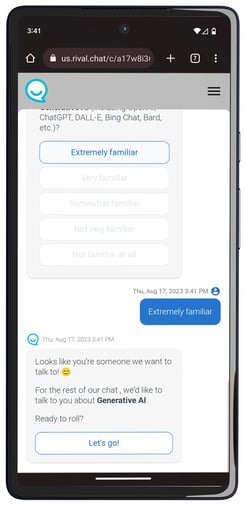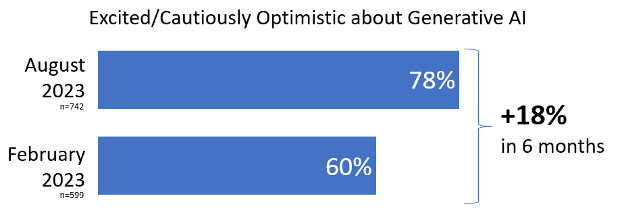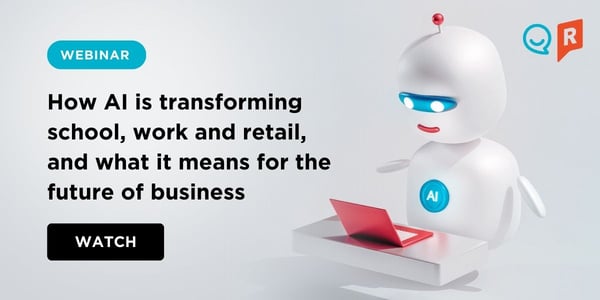71% of Americans familiar with AI have used some type of it before.
Generative AI is a huge topic among consumers and businesses today. The AI space is moving quickly, and insight pros play a crucial role in helping their colleagues understand how the adoption of this tech could impact product innovation, marketing, customer experience and strategy.
AI is also a huge topic for us at Reach3 and Rival Technologies. For one, in the past few months alone, we've already helped a number of Reach3 clients with research studies on AI and its business impact. AI is a core part of Rival's product strategy as well, and we're already incorporating it in various aspects of our market research platform.
Among my Gen Z peers, AI is a huge topic too. As a high school student, I've seen many people my age are trying out this tech. In school, many of my peers use ChatGPT for research, outlining, math help, and more. I even saw it used to craft an argument for a debate in Spanish class.
Online, I’ve seen AI image generators all over TikTok. Some use AI to create professional headshots, predict what their kids will look like, or make abstract art out of words.
These use cases of AI are just the tip of the iceberg. What other ways is Generative AI being used for? And what’s the sentiment towards it, are people cool with this new tech or see it as a problem? I felt compelled to get to the bottom of these questions, so our team at Reach3 conducted a research study to learn more.
 Using our conversational approach and Rival's mobile-first market research platform, we recently engaged nearly 750 consumers that are at least somewhat familiar with Generative AI in the US, ages 13-59. The study reveals insights on current consumer sentiment on AI, and also provides foresight on how it might impact society in the future.
Using our conversational approach and Rival's mobile-first market research platform, we recently engaged nearly 750 consumers that are at least somewhat familiar with Generative AI in the US, ages 13-59. The study reveals insights on current consumer sentiment on AI, and also provides foresight on how it might impact society in the future.
This exclusive study also included a deep dive on AI's uses in education or work, e-commerce and online advertising, as well as a follow-up on which top brands or companies are now associated with these new AI tools.
There's a lot to discuss about this research study, so we're starting a series on the Reach3 blog to dissect what we found. In this article, I'd like to focus on what we found in terms of overall sentiment towards AI. If you'd like to get notified when new blog posts about Generative AI come out, feel free to sign up for our content below.
What is Generative AI?
This research study focused on one particular type of artificial intelligence: Generative AI. A quick primer might be useful to make sure we're talking about the same thing.
Generative AI refers to any type of algorithm that can be used to generate realistic content such as text, audio, images and videos, based on various voice/text inputs. ChatGPT is of course the most popular Generative AI tool in the market—other notable ones include Google's Bard and the image-generation app Midjourney.
Consumer familiarity and sentiment on Generative AI
Our findings revealed that since early February, there has been a significant positive change in people’s attitudes towards AI.

Of those surveyed, the vast majority today (78%) feel optimistic about generative AI (compared to 60% in February). More notable is how few are actively worried about it—only a small fraction of people (5%) feel negatively.
For now, Generative AI is an exciting new frontier.
Why are people excited about Generative AI?
It’s the wide-open possibilities that encourage much of the excitement, with many people feeling that AI can do almost anything.
People are drawn to its convenience and speedy working ability; anyone can access these tools now and be getting results within minutes. They also like how it’s different and can feel shockingly lifelike in how it responds; Generative AI has a sense of individuality and is more curated than a typical search engine (though the accuracy is not perfect yet).
“I think it’s cool how you’re able to get a unique and personalized response to any sort of question or prompt that you ask ChatGPT. I also think it’s cool as a tool for someone who might have a learning disability. It’s been super helpful for my friend to get thoughts down before he’s able to write.”
What are consumers' top concerns about Generative AI?
Despite the widespread excitement most have of the promise AI tools can have, there’s still plenty of concerns to address. Some fear that robots will become more effective and efficient than people, taking away jobs as companies look to cut costs and boost profits even more.
Other fears concern privacy and data collection, for these tools to work they’re constantly ingesting information posted online without consent. It makes us wonder, how much of the information we input—anywhere on the web, not just into the AI tools—is being saved, stored, or utilized to train AI?
Additionally, there is a looming dread that humans will become lazy and incompetent due to an over-dependency on this technology. Finally, AI can be used in countless ways, but that leaves risk for the wrong uses, such as cheating, identity theft, and forging information.
With these concerns, businesses need to engage and listen to their customers as they roll out new AI capabilities.
“The thing that worries me a little bit about AI is just how… I think it might have the ability to take over some jobs in the workforce in the future.”
What makes people skeptical about Generative AI?
Some people are still on the fence about Generative AI. They have many of the same concerns as those against it, but are in more of a “wait and see” approach. They aren’t quite sure they can trust the accuracy of it yet since it’s so unfamiliar and untested (possibly justified too, as this lawyer found out). It’s so new that there haven’t been rules or guidelines put in place to regulate it yet.
Some even feel a sense of guilt using the technology because it feels like cheating when it works so well. It’s unsettlingly human, which can be deceptive when used in situations where people don’t realize they aren’t talking to a real person. Finally, it deprives people of the opportunity to creatively think.
“Something that makes me unsure about AI is just the lack of knowledge about its capabilities and the lack of guidelines around its usage.”
These words remind of the saying, “just because you can, doesn’t mean you should.” Even though we have access to powerful tools like Generative AI, it doesn’t mean we can be reckless with our usage.
How consumers define Generative AI
“Generative AI is an intensely extraordinary thing, as it comes up with the results in a matter of seconds, no matter of the specific instructions or details you want it to generate for you. It uses information from all over the world from books, online pages and old records to implement into this specifically wanted generated item, image, response, etc.” - Male, 18-20
Today 37% of the US public are familiar with Generative AI (including OpenAI, ChatGPT, DALL-E, Bing Chat, Bard, etc.), showing that familiarity is indeed creeping up since its debut several months ago (~a-third familiar in February). With increasing familiarity, people have developed a solid understanding of Generative AI.
Five themes emerged from our research study:
1. New, futuristic technologyThis one is self-explanatory. Generative AI is seen as new and futuristic, and the possibilities are yet to be fully discovered.
2. Creative, innovative, intuitiveGenerative AI seems smart. It can create new, unique responses, and generate sophisticated results, though we’re learning that it’s not always quite as accurate as we hope–yet.
3. A helpful tool or personal assistantGenerative AI can complete your small, possibly mundane, tasks so that you don’t have to. Just think, instead of spending half an hour writing out your grocery list, you could tell it what you want for dinners that week and it’ll write out the grocery list for you. It can complete correspondence, schedule appointments, and plenty more.
4. A conversational chat bot that generates human-like responsesThis form of generative AI concerns text-specific entities like ChatGPT, which rely on an input text to create an output also in text form. These chatbots are essentially conversational robots and it’s easy to fall into a back and forth conversation with it.
5. A reliable but not trustworthy tool that must be used with cautionAlthough most of the responses are positive and optimistic, skepticism lingers. Concerns center on thinking that AI could become too smart and take over the world at some point, use data for harmful purposes, or just a general sentiment of mistrust.
Use cases for Generative AI—a mix of the predictable and the surprises
Out of 700+ Americans that are at least somewhat familiar with Generative AI, 71% of have used some type of AI before, and 29% haven’t. Which begs the question: what are people currently using AI for?
The one that surprised me that I hadn’t initially considered is many people simply use AI recreationally. Yes, the majority of people were using AI for work, school, or to spark their creativity, but others were simply bored. Some have conversations with ChatGPT even though it’s not designed for that, and other companies are creating AI chatbots that are specifically built to form relationships with people. Some may simply use them for fun, but others have found an outlet for their loneliness in AI.
Looking more broadly, there’s not one specific utility that stood out—because the uses are truly unique. Some examples:
- Image generator (for art inspo or recreationally)
- Writing (essays, stories, poems, love letters, etc.)
- Therapy/advice (financial, technical, ethical, love)
- Recommendations (travel, recipes, etc.)
- Translation
- Talking to “someone” (ease loneliness)
- Playing games
- Random personal questions
The vast majority of Generative AI users had a mildly positive to very positive experience, and they emphasized its speed and efficiency. Some even said their experience was fun. A few who aren’t so positive, felt it was a bit nerve-wracking and intimidating.
A small few even declared that it was decent, but that a person can do better.
“Honestly at this point I love using it just for fun. [For example,] asking questions and seeing what answers I get.” - Female, 31-40
“I used an AI as a way to socialize, even if it's not a real person, I feel that it helps having communication throughout the day when my friends are busy.” - Female, 13-17
Why are some people holding out on using Generative AI?
Among the third of non-users, a majority (61%) of these non-users plan to use Generative AI in the near future. The main reasons for not having used it yet were no need or interest, they hadn’t made the time to use it, or they had trouble accessing it.
On the contrary, a minority (39%) of non-users don’t plan to use generative AI in the future, because they simply prefer to complete their own work, or they feel uneasy with the technology’s unfamiliarity.
Running your own research study on Generative AI
As a summer intern, it was very exciting to be able to work on this research. I learned a lot and this was a great experience.
I was surprised by how much research participants were very willing to share their excitement, hopes and concerns on AI. As you can see from the videos and open-end responses I've shared above, people weren't afraid to be candid and specific!
Curious how we capture those insights? It's because of conversational research—an approach that feels immersive, natural and organic to participants. The tech that we use, combined with the way we design our research studies, delivers a more fun respondent experience without compromising on rigor or robustness of our studies.
If you're looking for a full-service market research firm to partner with to understand what's next in Generative AI, Reach3 has the experts you need. We have experts in the tech industry who can help you navigate what's ahead. Also, the Rival platform, which is the core technology in most our research studies, uses AI to make it easier and faster to capture deeper insights.
Have a new research topic on your roadmap? Curious about our capabilities and product roadmap? Reach out to our team and see how we can work together.

Charlotte Johnson
Summer Intern, Reach3 Insights








.webp?width=65&height=83&name=A-LIGN_HIPAA%20(1).webp)

